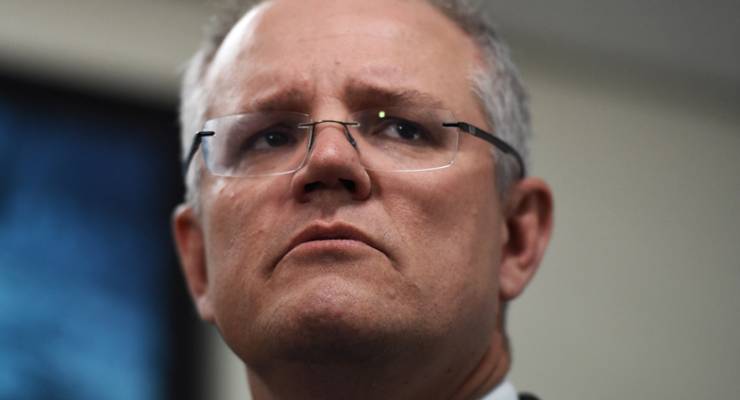
On the eve of Treasurer Scott Morrison’s first federal budget, most economic news is bright for the world but grim for Australia.
Data released by the Australian Bureau of Statistics (ABS) and other agencies through April confirm a global recovery is well underway but that Australia is lagging badly.
Inflation
Wednesday’s consumer price index figure for the March quarter at -0.2% is good for consumers. But it indicates demand for goods and services falling away and economic activity declining. This is the first quarterly drop since the global financial crisis (GFC) hit the world in December 2008.
Employment
The latest job figures appear positive at first glance. March’s headline jobless rate of 5.7% was better than February’s 5.8%, and the lowest since the September 2013 election. But that’s not saying much. Unemployment fluctuated between 5.7% and 6.3% over the last 12 months. Through Labor’s last year it ranged between 5.2% and 5.8%.
But here’s the thing: total hours worked — a measure the pro-Coalition mainstream media ignore unless it suits them — fell in March for the second consecutive month. The current level of 83.83 hours worked per adult — equivalent to just 19 hours a week — is the third lowest since 1994. The two lower levels since then were in October and December 2014 during the slump following Joe Hockey’s first failed budget.
This confirms employers are taking on casuals or part-timers instead of full-time workers, with the economy generating less paid work overall.
Meanwhile, jobs are growing elsewhere in the world. The unemployment rate in the 34 developed countries comprising the Organisation for Economic Co-operation and Development (OECD) averaged above 9% in 2013 and now has fallen below 8%.
Tax revenue
ABS figures on taxes collected in 2014-15, released Tuesday, confirm employment is declining, corporations are not paying what they used to and taxes on workers are rising. Total Commonwealth revenue increased a puny $4.3 billion on 2013-14, or just 1.2%. This is below budget and nowhere near what is needed to meet outlays.
Personal income tax was up $13.0 billion, or 7.8%. Yet payroll tax — self-assessed by employers on their wage bill — is down $109 million, a thumping 12.9%. So either far fewer wage earners are being taxed much more heavily, or employers are fudging their figures. Or both.
The fringe benefits tax — mostly paid on perks for high-income earners — went up a healthy $108 million or 2.5% to its highest level ever. So clearly the corporate sector is doing nicely. This we know already from increased turnover, revenue, dividends and directors’ fees revealed in company reports.
Yet total income taxes levied on enterprises declined more than $3.1 billion from the previous year, or 4.1%. This bolsters evidence from the ATO’s annual reports, its transparency report and the Senate inquiry that corporate tax evasion is rife.
Government borrowings
Net debt, according to the Finance Department, expanded in March to $288.7 billion. That exceeds by $10 billion the budgeted figure for the full year of $278.8 billion, with three months to go. It exceeds the puny $174.6 billion at the end of Labor’s management of the GFC by 65.3%.
Gross debt, according to the Office of Financial Management, expanded in March from $408.9 billion at the end of February to $417.5 billion. By mid last week this had blown out further to $423.2 billion. That’s up 7.5% just in the six months Morrison has been treasurer. It is a blow-out of 52.6% since the last election — won on a promise of reducing Labor’s debt.
Most OECD countries are steadily reducing borrowings. The latest Trading Economics data shows 19 of the 34 member countries have less gross debt now than in the previous reporting period. Seven are holding steady or increasing it marginally. Only eight are still piling on the debt at a rate above 1.6% per year. Australia’s current expansion rate of 9.6% is exceeded only by Chile and Norway.
Business confidence
Business conditions are the best since 2008, according to the National Australia Bank’s April data. This confirms positive global conditions. Yet business confidence rose only marginally from three to six, still half the 12 registered at the September 2013 election. This verifies Australia is not participating in the global resurgence.
Trade
As Crikey explored earlier, April trade figures reveal the most dismal performance in Australia’s history.
***
Hence Malcolm Turnbull and his embattled party will be hoping Scott Morrison can perform some kind of magic with Tuesday’s federal budget. Unfortunately, all the indicators so far suggest he has no better grip than his hapless predecessor.








The goose that laid the golden “So where the bloody hell are ya!” egg?
They’d be doing far better of course were it not for Crikey and its fellow capitalist media companies making it so difficult to sell the economically sound ideas Australian Governments might wish to promote.